|
Printables |
PowerPoints |
Online exercises |
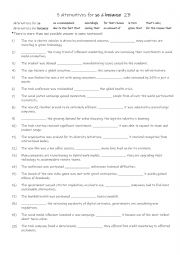
|
5 alternatives for both so & because 2B
First, students need to familiarise themselves with the 10 words and check their meaning and use. Then they read the sentences to see which one is needed to complete the sentence. Each word is used 2 times! Answers on page 2.
Level: intermediate
Age: 10-100
Type:
Downloads: 112
|
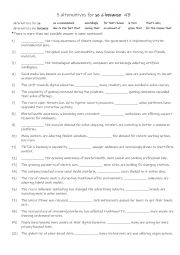
|
5 alternatives for both so & because 4B
First, students need to familiarise themselves with the 10 words and check their meaning and use. Then they read the sentences to see which one is needed to complete the sentence. Each word is used 2 times! Answers on page 2.
Level: elementary
Age: 8-100
Type:
Downloads: 121
|
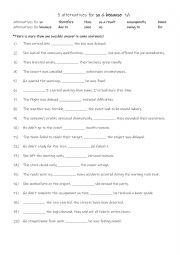
|
5 alternatives for so & because 1A
First, students need to familiarise themselves with the 10 words and check their meaning and use. Then they read the sentences to see which one is needed to complete the sentence. Each word is used 2 times! Answers on page 2.
Level: elementary
Age: 9-100
Type:
Downloads: 102
|
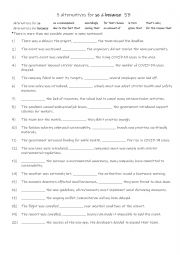
|
5 alternatives for so & because 3B
First, students need to familiarise themselves with the 10 words and check their meaning and use. Then they read the sentences to see which one is needed to complete the sentence. Each word is used 2 times! Answers on page 2.
Level: elementary
Age: 7-100
Type: worksheet
Downloads: 106
|
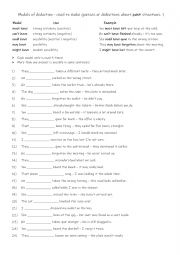
|
5 modals of deduction - used to make guesses or deductions about past situations. 1
Students should learn modals of deduction because they are useful for expressing logical guesses or assumptions about past situations, helping speakers show how certain or uncertain they are. These modals, such as must have, might have, could have , and can�t have, make speech sound more natural and fluent, improve communication and reasoning ski...
Level: elementary
Age: 10-100
Type:
Downloads: 116
|

|
5 Modals of deduction - used to make guesses or deductions about past situations. 2
Students should learn modals of deduction because they are useful for expressing logical guesses or assumptions about past situations, helping speakers show how certain or uncertain they are. These modals, such as must have, might have, could have , and can�t have, make speech sound more natural and fluent, improve communication and reasoning ski...
Level: elementary
Age: 9-100
Type:
Downloads: 106
|
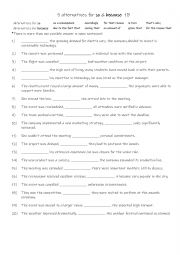
|
5 more alternatives for so & because 1b
First, students need to familiarise themselves with the 10 words and check their meaning and use. Then they read the sentences to see which one is needed to complete the sentence. Each word is used 2 times! Answers on page 2.
Level: elementary
Age: 8-100
Type:
Downloads: 102
|
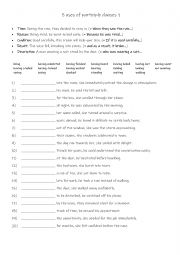
|
5 uses of participle clauses 1
Students should learn the five uses of participle clauses because they help create more concise, fluid, and sophisticated sentences. These clauses allow for the expression of time, reason, condition, result, and description in a shorter, more efficient way, making writing and speaking more dynamic and less repetitive. For example, participle clause...
Level: intermediate
Age: 10-100
Type:
Downloads: 108
|
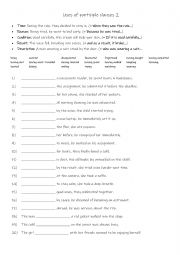
|
5 uses of participle clauses 2
Students should learn the five uses of participle clauses because they help create more concise, fluid, and sophisticated sentences. These clauses allow for the expression of time, reason, condition, result, and description in a shorter, more efficient way, making writing and speaking more dynamic and less repetitive. For example, participle clause...
Level: intermediate
Age: 10-100
Type:
Downloads: 119
|
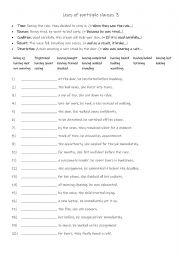
|
5 uses of participle clauses 3
Students should learn the five uses of participle clauses because they help create more concise, fluid, and sophisticated sentences. These clauses allow for the expression of time, reason, condition, result, and description in a shorter, more efficient way, making writing and speaking more dynamic and less repetitive. For example, participle clause...
Level: intermediate
Age: 10-100
Type:
Downloads: 118
|
|
|
|
|












